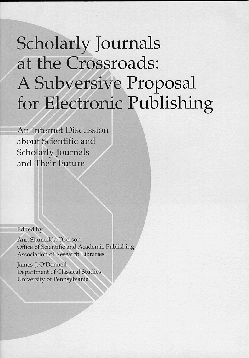

Paper-based reviews:
Sylvia, Margaret. Scholarly Journals at the Crossroads: A Subversive Proposal for Electronic Publishing, An Internet Discussion About Scientific and Scholarly Journals and Their Future. (book reviews) Library Journal v120, n20 (Dec, 1995):166.
Herbert, Rosemary. Scholarly publishing at crossroads - university presses. Christian Science Monitor v76, secB (Fri, Jan 6, 1984):B6, col 1, 20 col in.
Brent, Doug. Stevan Harnad's "Subversive Proposal": Kick-starting electronic scholarship - A summary and analysis. Information Society v11, n4 (Oct-Dec 1995):275-283. http://rachel.albany.edu/~ejournal/v5n1/article.html
Gehrig, Virginia Gatcheff. Scholarly Journals at the Crossroads: A Subversive Proposal for Electronic Publishing. Information Today v12, n10 (Nov 1995):19,21. Keown, Damien. Caxton: Is he Dead or Merely Resting? Times Higher Education Supplement, February 11 1996 p. vii
Six principal discussants and about two dozen others advance radical and traditional views; they argue for overhaul of journal publication systems or advocate careful preservation of traditional values and roles. Will electronic technologies save us from the economic pressures of the current papyrocentric publishing system or will they be more expensive than we dreamed? In his "Overture to the Subversive Proposal," Stevan Harnad (Cognitive Scientist, University of Southampton) writes, "For centuries, it was only out of reluctant necessity that authors of esoteric publications entered into the Faustian Bargain of allowing a price tag to be erected as a barrier between their work and its intended readership, for that was the only way they could make their work public at all during the age when paper publication was their only option." [Ariadne article]
Lorrin Garson (pioneer and leader in electronic publishing at the American Chemical Society) responds, "I would like to suggest that publishing electronic journals is in fact going to be more expensive than printing. The collection, maintenance and dissemination of these data will be more costly than printing, but the information will be much more valuable to the scientific community. Of course, when we get to this point we won't be publishing journals; the output will be called something else." Paul Ginsparg (Los Alamos National Laboratories), Bernard Naylor (Librarian, University of Southampton), Andrew Odlyzko (AT&T Bell Labs), and Frank Quinn (Virginia Polytechnic Institute and State University) also offer thoughtful essays and provocative viewpoints.
Scholarly Journals at the Crossroads makes publishing history. It is the first time that a book derived from a series of wide-ranging Internet discussions on a scholarly topic recreates (insofar as possible) an e-mail experience for a general academic and publishing audience.
In their Conclusion, Ann Okerson (Association of Research Libraries) and James O'Donnell (Professor of Classics, University of Pennsylvania), the editors of this 9-month long networked conversation write, "This is a book about hope and imagination in one corner of the emerging landscape of cyberspace. It embraces passionate discussion of an idea for taking to the Internet to revolutionize one piece of the world of publishing."
The book includes a detailed table of contents, specially written introductory and concluding chapters by the co-editors, a "hyperlink" bibliography showing where materials in the book can be read on the Internet, and a glossary of terms used by the discussants.
The Association of Research Libraries is a not-for-profit organization representing 119 research libraries in the United States and Canada. Its mission is to shape and influence forces affecting the future of research libraries in the process of scholarly communication. ARL programs and services promote equitable access to, and effective use of recorded knowledge in support of teaching, research, scholarship, and community service. These programs include annual statistical publications, federal relations and information policy, and enhancing access to scholarly information resources through telecommunications, collection development, preservation, and bibliographic control. The Office of Scientific and Academic Publishing works to identify and influence the forces affecting the production, dissemination, and use of scholarly and scientific information.
The book is produced in 7 x 10 format, paperbound, in 250 pages. Its ISBN number is: 0-918006-26-0
To contact the editors:
To receive detailed order information by e-mail: osap@cni.org
All other inquiries:
Patricia Brennan
Information Services Coordinator
Association of Research Libraries
21 Dupont Circle, NW, Suite 800
Washington, DC 20036
patricia@cni.org
phone: 202-296-2296
fax: 202-872-0884